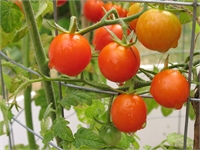
Victory Gardens Provide Sustainable Food Supply
Important Notice: Our web hosting provider recently started charging us for additional visits, which was unexpected. In response, we're seeking donations. Depending on the situation, we may explore different monetization options for our Community and Expert Contributors. It's crucial to provide more returns for their expertise and offer more Expert Validated Answers or AI Validated Answers. Learn more about our hosting issue here.

Victory Gardens Provide Sustainable Food Supply
You must be logged in to post a comment.
Victory gardens are regaining popularity in the United States as more desire local, organic food. Unlike fruits and vegetables grown on industrial farms, home gardens can provide food without the associated pollution of pesticides and the transport to grocery stores. In addition, with a little wise management, the seeds from the fruits and vegetables can be stored and planted in coming years.
Historically, victory gardens were created during World War I and World War II as a means to give families an additional food source during a time of scarcity. Because many agricultural workers had been drafted into the military, the industry itself was unable to keep up with demand. Utilizing the remaining labor of women and children seemed the only possible choice in the situation. By gardening their lawns and rooftops, families could decrease the cost of the food needed for the military even as they increased their own food supply during a time of rationing.
As the shipment of food has become a worldwide industry, grocery shoppers have lost a sense of when a food is in season. Vegetables and fruits can be imported from any country, thus making all available at any time of the year. The local foods movement, though, would like to move away from this viewpoint as the situation is inherently unsustainable. By returning to foods that are only grown locally, individuals can regain their connection with the seasons even as they enjoy flavorful food that has not been shipped thousands of miles. Although local food does not have to be environmentally friendly in that it can be grown with pesticides, organic gardening methods can be a means to gain a truly sustainable food supply.
Victory gardens obviously can be the ultimate in local food. While most will not be able to provide all of their food from their own garden, they can supplement their produce through planting various crops. With the rise in food prices and a faltering economy, it can be a necessary supplement for some. In addition, learning the skills required for growing food can provide a sense of pride in self-sufficiency.
Although vegetable gardening requires research and physical labor, it can be a rewarding effort, both psychologically and monetarily. Returning to the victory gardens of the past can provide an incentive for a more sustainble future.